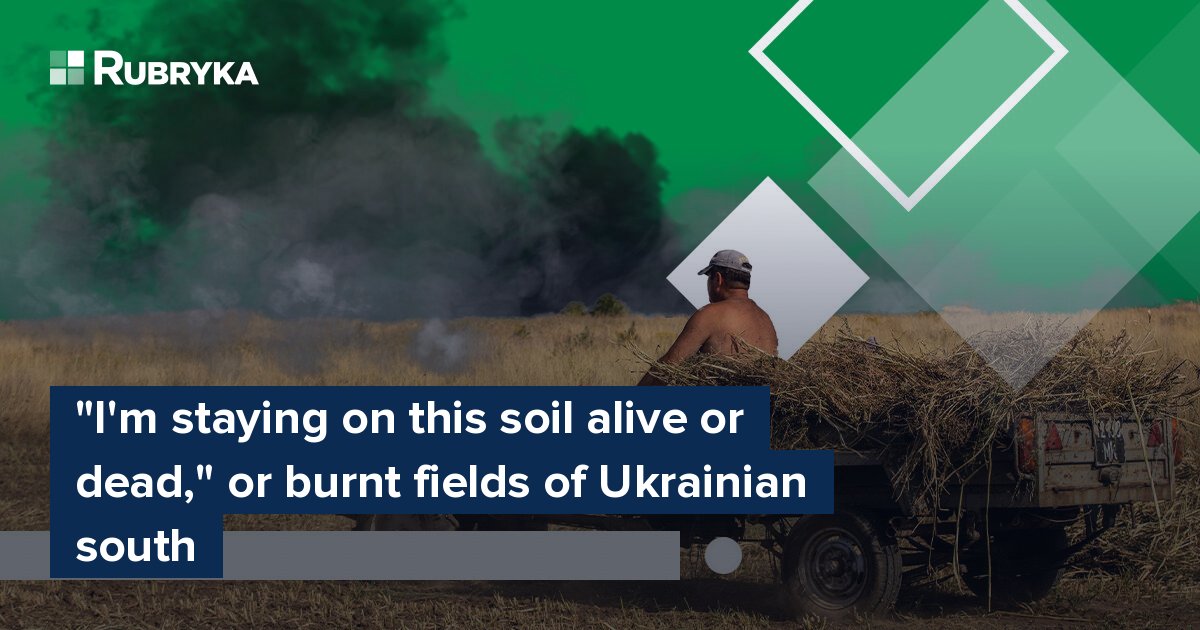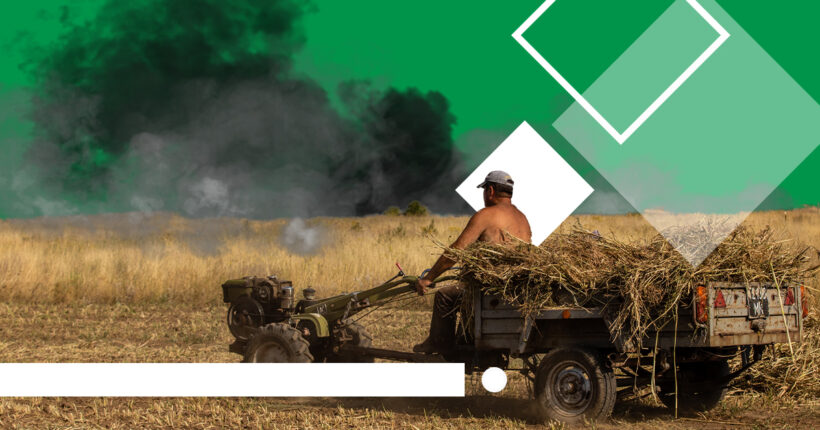
It's impossible to fully assess the impact of the war on agriculture until all Ukrainian territories are liberated. However, we must now talk about what the farmers were left with, besides lost crops, credit problems, limited access to specific equipment, and subsequent restoration of damaged soils.
Rubryka visited the Mykolaiv region, where fields burned particularly often this summer, and learned how farmers who lost everything live and what they do with damaged land.
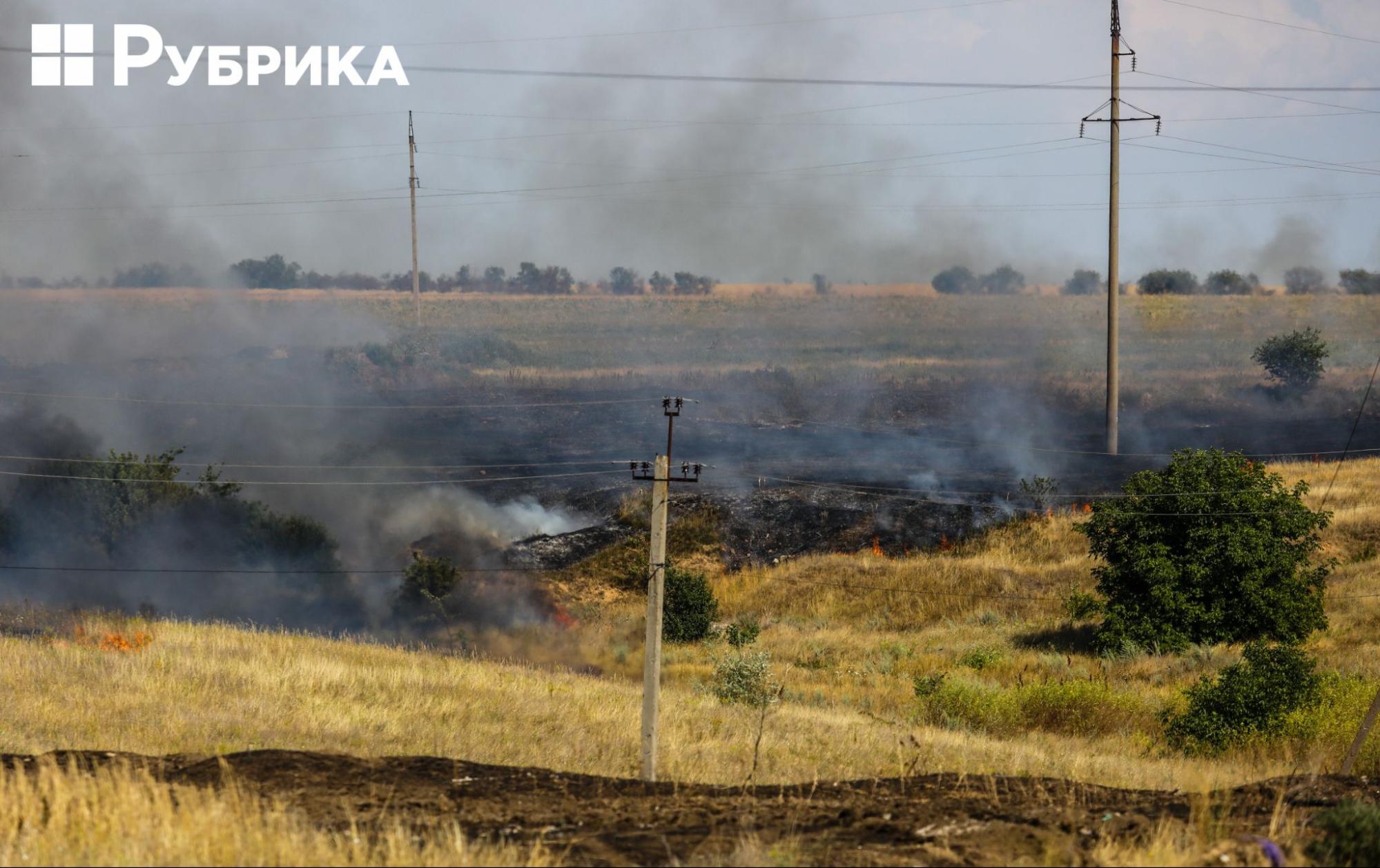
"Someone has to get food"
The village of Lymany, Mykolaiv region. The firm, tanned hands of 61-year-old Vasyl deftly wield pitchforks. His skin is covered in thick soot and sweat. On the day of our meeting and the rest of the days of the summer of 2022, it's sweltering under the southern sun. In addition to the hot climate, the Mykolaiv region has been shelled by the russian forces and left with fires afterward. The farmer begins to tell his story without stopping work; the fire from the opposite part of the field creeps slowly but surely.
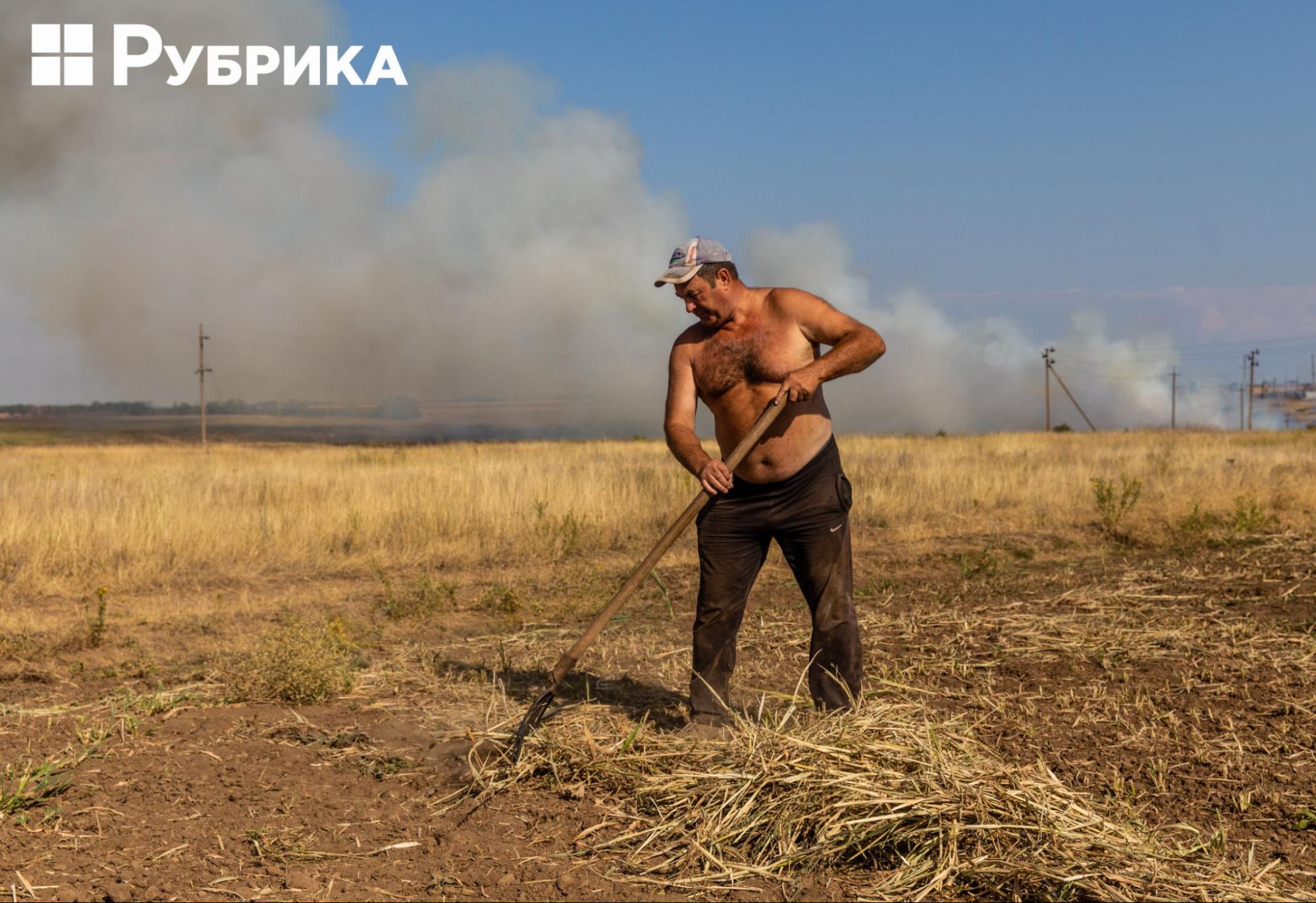
"I have been here all my life. I was born here and came to the soil here. All these people were given plots, and they left and let me do what I wanted. So I planted a little here. Over there, behind the ravine, I have another plot. Look, it's on fire… I want to harvest what I can before the fire reaches," says Vasyl.
The man worked as a driver all his life. On February 24, as he says, "everything stopped, and only the soil remained" with him. Vasyl's pension is a little more than two thousand hryvnias per month. He cannot feed his family with this money. However, if you harvest and sell the crop, it becomes easier. He is a small farmer, but people like him feel the loss of land most acutely.
The man talks daily about how he used to pick up the almost wild cows abandoned by their owners in the village, how his family took in neighbors who lost their homes, and the regular shelling that finds him in the field.
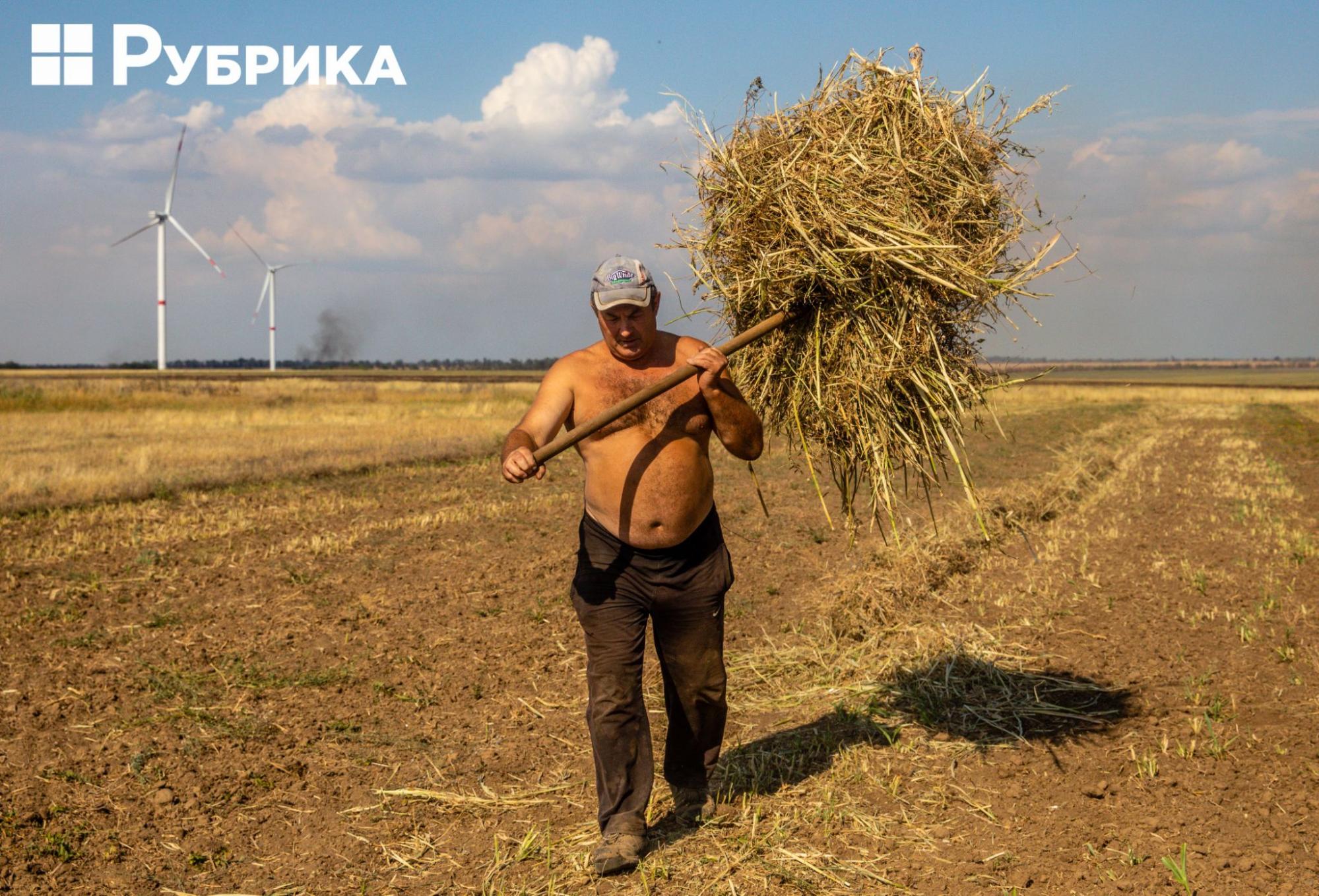
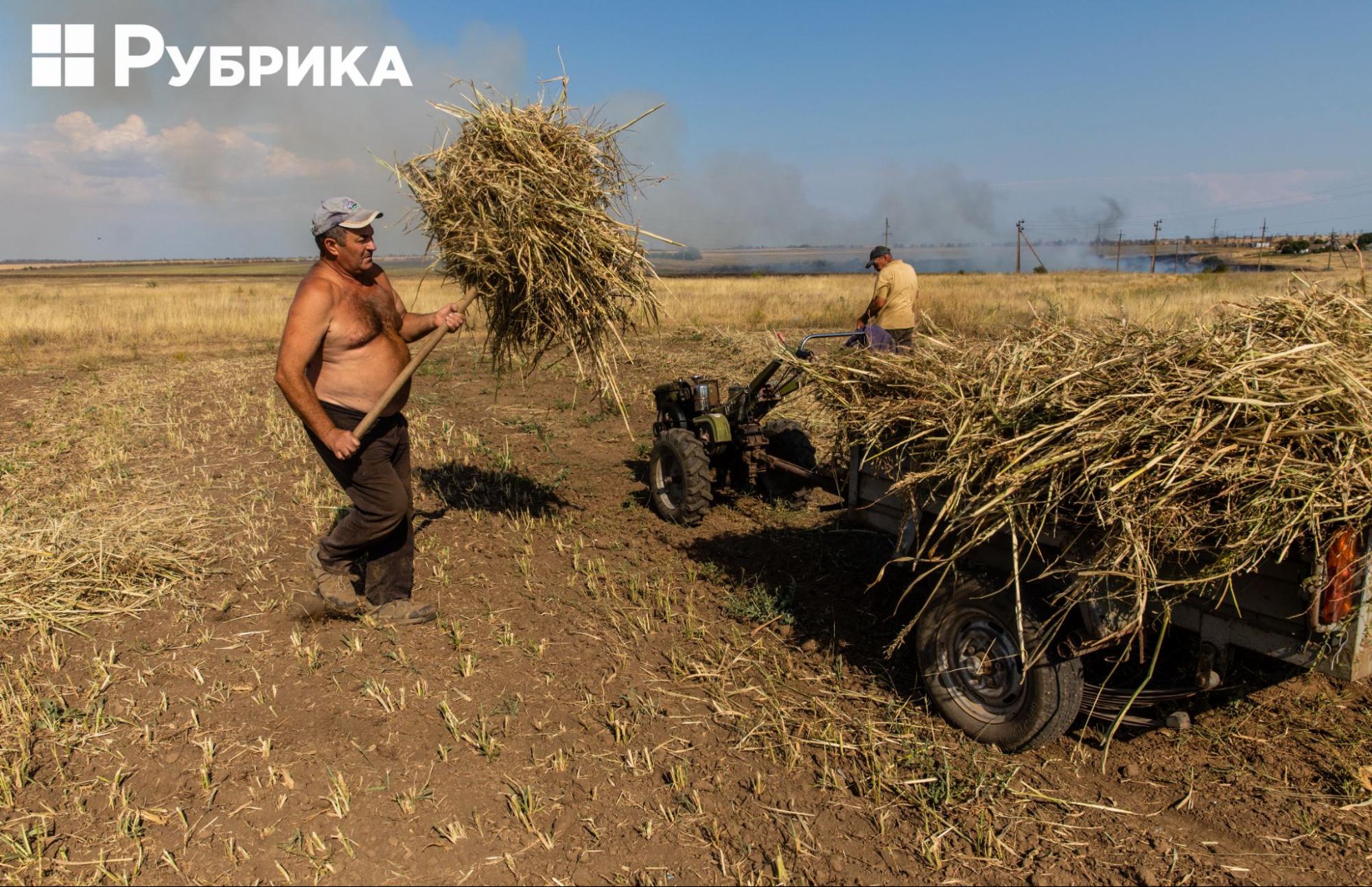
"For instance, today. It blew for the first time, perhaps, 800 meters away. I hid behind the tractor. Then there was the second explosion. I waited for the third one another 10 minutes, then went on to work. Someone has to get food. We cultivated this land. How can we throw it away? The land here is terrific.
Once I just left the ravine part of the village and was covered with cluster munitions. But over time, you get used to these sounds. It's not about fearlessness. It's just that you start to distinguish what it is and where it will come from now by the sounds. It's now exploding somewhere far away. But once it happened, I started the tractor to maximum speed and ran away as far as the eye could see. And they are getting closer and closer. And I'm at full gas…, and I'm alive," the farmer concludes.
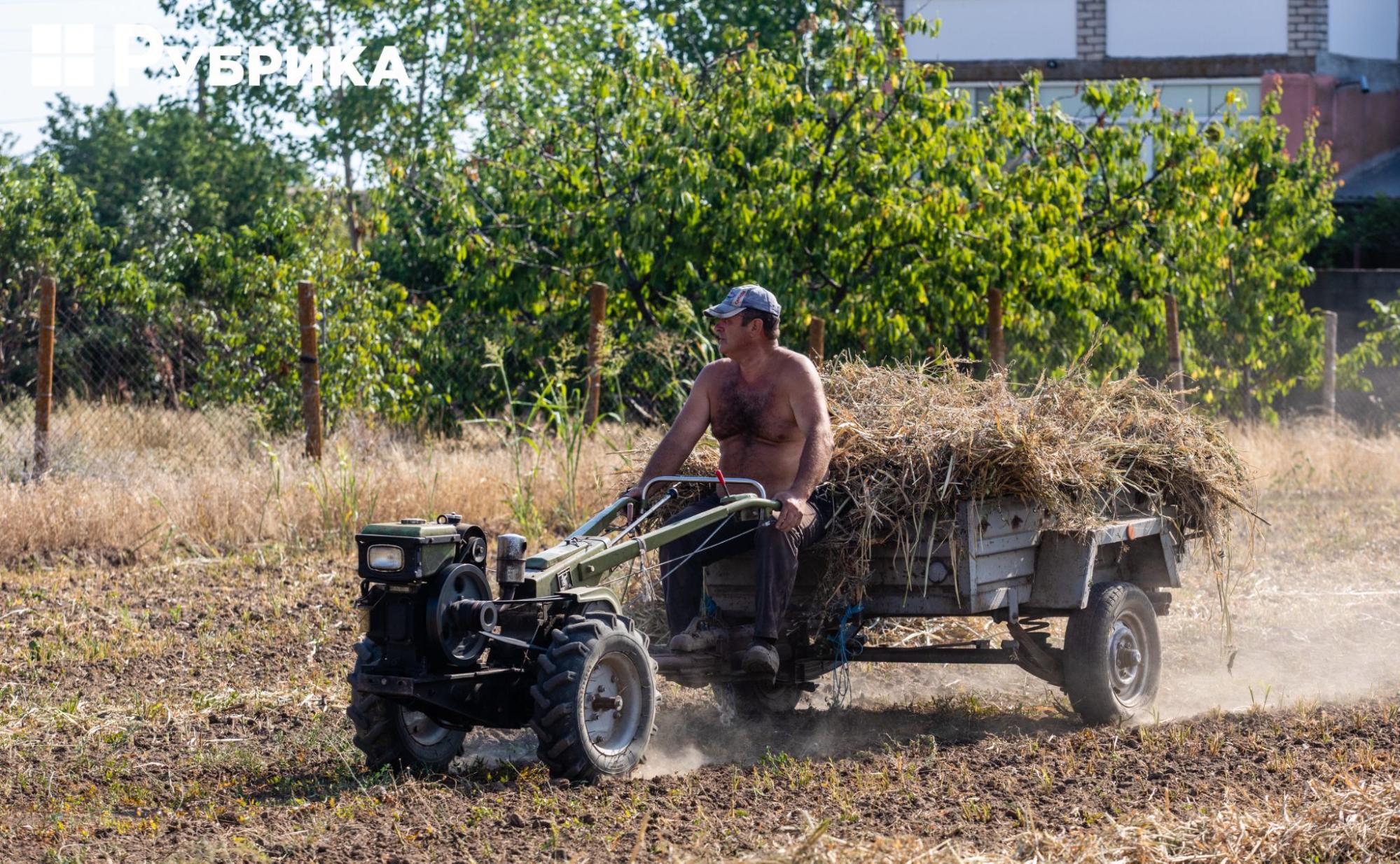
The Minister of Internal Affairs of Ukraine, Denys Monastyrskyi, said that demining Ukraine would take about ten years. Several other officials and experts make similar and sometimes less comforting forecasts. The total area of the fields that need demining is unknown today. However, it's known that there are not enough sappers in Ukraine for this.
Priority in demining is given to roads and forest lines close to them. Along with the growing number of liberated territories, new needs for demining are also growing. It's not like the fields are left somewhere on the periphery. There aren't enough people to deal with them.
At the end of February, Moldova volunteered to send its sappers to Ukraine, and Germany and the Netherlands decided to start training Ukrainian sappers and provide the necessary equipment. But Ukraine's real needs are much greater. News reports of people blowing themselves up on seemingly demined land highlight this in bright red.
"What will you mow? All the fields are already burned"
Near the field where 61-year-old Vasyl works is a small house near which Natalia Panashii, the village head of two nearby settlements, Luparevo and Lymany, greets us.
The woman tells the story of how the russians destroyed the village council, which she was supposed to chair. After the seventh strike on the building, Mrs. Natalia stopped counting the following ones. She doesn't count how often the shells are dropped into the field near her house.
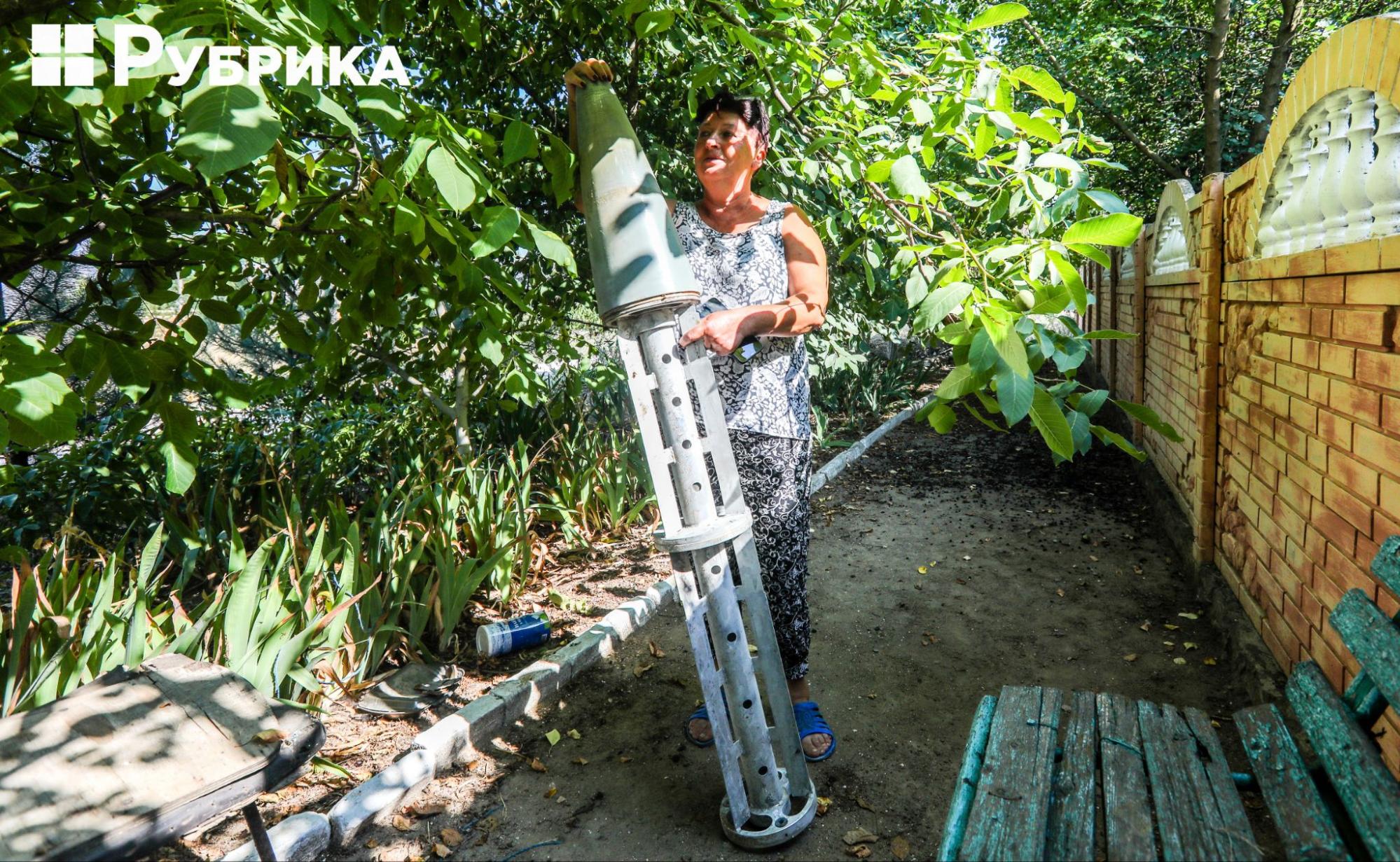
Natalia with a part of the rocket that fell near her house but did not explode
"At the beginning of the full-scale war, we mowed weeds in the village. We didn't think it would get here like this. At first, it was kind of calm. And it all started somewhere on March 20. People from Kherson fled through our territory. There was already a war there, but not here yet.
Now it keeps coming. It is unbearable to watch our fields burn. A friend calls me: 'Natalia, would you give me permission to drive into the field, see if we can mow something?" I say to him: 'Are you normal? First, I do not give such permission. And second, what will you mow? All the fields are already burnt.'
Do you see that red visible? It's a hose field, as we say. It was always adequately watered. And it's one thing they [russians] shell it, but all the pipes are broken. There is nothing to water them with [the woman talks about the water main, which the russians destroyed at the beginning of the escalation, — ed.]. The wind rises, and it all flies to the village. No one can do anything to it. Watch the plantings starting to burn up. And it burns in one place. I am very worried. Firefighters don't get to us, and we put out what we can ourselves," Natalia Panashii says.
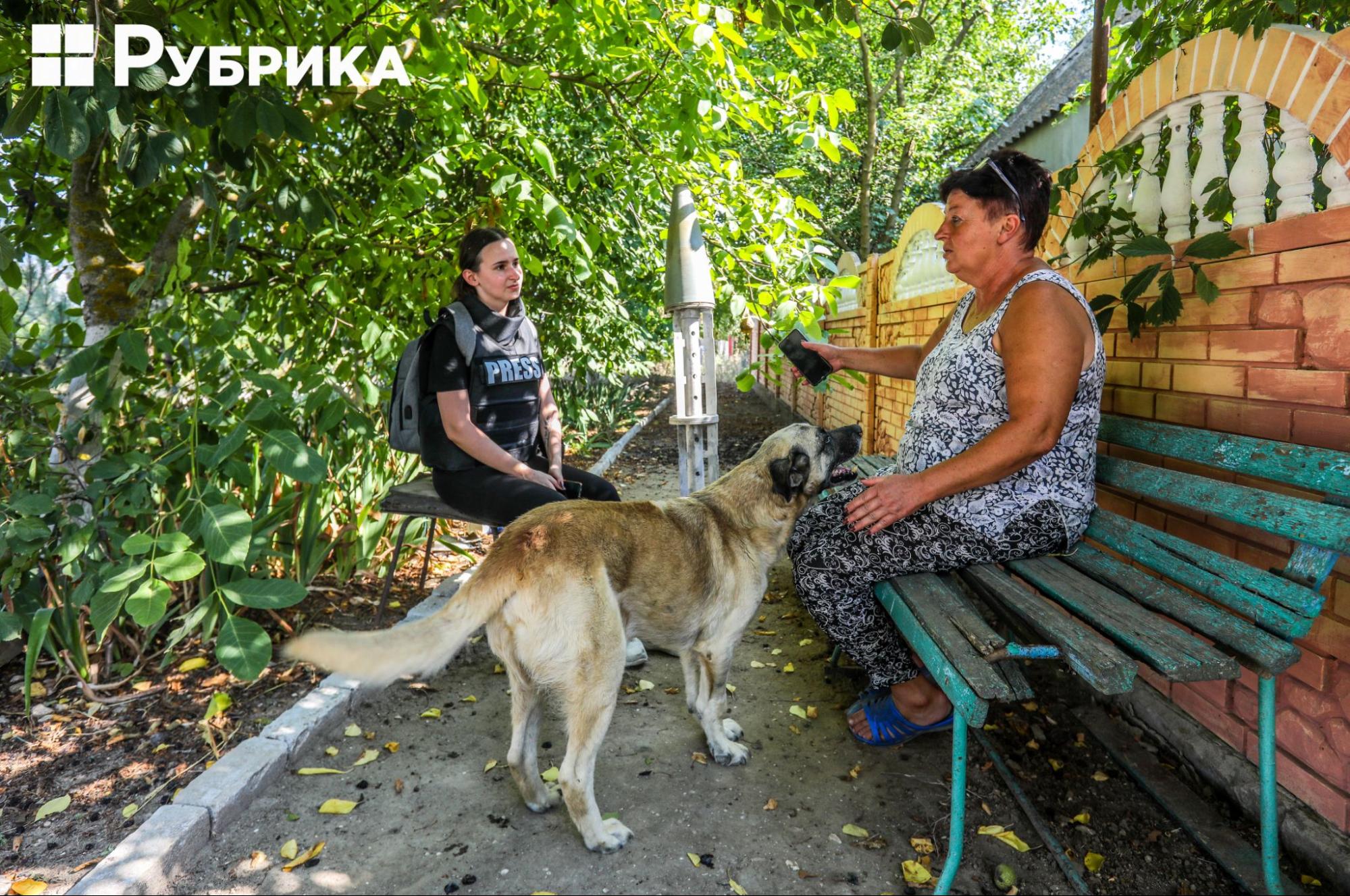
The woman says that the farmers in her community were left without a harvest. People who left entrusted their plots to those who stayed, as happened with the Vasyl mentioned above. But some farmers engaged in large-scale production and worked with large companies. The woman says they are primarily concerned about when the degraded lands will be able to give fruit again.
With this question, we are turning to environmentalist Yulia Katyba. She says that the soil problem in Ukraine began long before the war. The level of plowing of our soils was one of the highest in Europe and amounted to 53%.
"Soil is not only a black porous layer of material. It is a substance formed over decades, which contains many characteristics: pH, air and water permeability, fertility, and density.
Soil fertility depends on the content of humus in it. This layer in some places is only up to 1 cm. Humus is an organic substance; in other words, humus from plants, insects, worms, etc. Under the influence of high temperatures, this layer is destroyed (the soil can burn up to 5 cm deep), and it takes several dozen years to restore it.
If a rocket hits the field, the consequences are even worse: when the missile strikes, a crater of the size of a meter and more is formed; humus enters the air ("knocks out" due to impact); in the fall radius it is oxidized and contaminated with heavy metals; pollutants enter the groundwater; the fire that occurs burns the upper fertile layer," the expert explains.
"I sold the car and pay salaries to my boys and taxes to the state"
Serhii Dzuman launched his Titan Agro farm on the eve of the war in eastern Ukraine almost nine years ago. All of his 400 hectares of fields were in the Mykolaiv region, and the company lost more than 80% of the crop due to shelling. Two hundred fifty hectares of fields were wholly burned, and part of the fields could not be harvested because of the danger.
"We now have one question. What to do next? Now they have issued a ban on going out into the field to carry out agricultural work. In the meantime, I am preparing papers with a detailed record of where my plots are located. We pass it on to the community and our land manager. Then a commission will be created, and we will submit all information to the administration. We will apply everywhere so that everything is registered and we can get some kind of compensation, at least for the grain group. These are colossal losses.
The second issue is farmers who lost equipment and property and had loans. Banks are silent now, and they don't say anything. What should we do while they are counting the losses and keeping statistics? They give deferments for a year, but even if I go to the field in exactly one year, I will have a profit in the best case in a year and a half," says Serhii Dzuman.
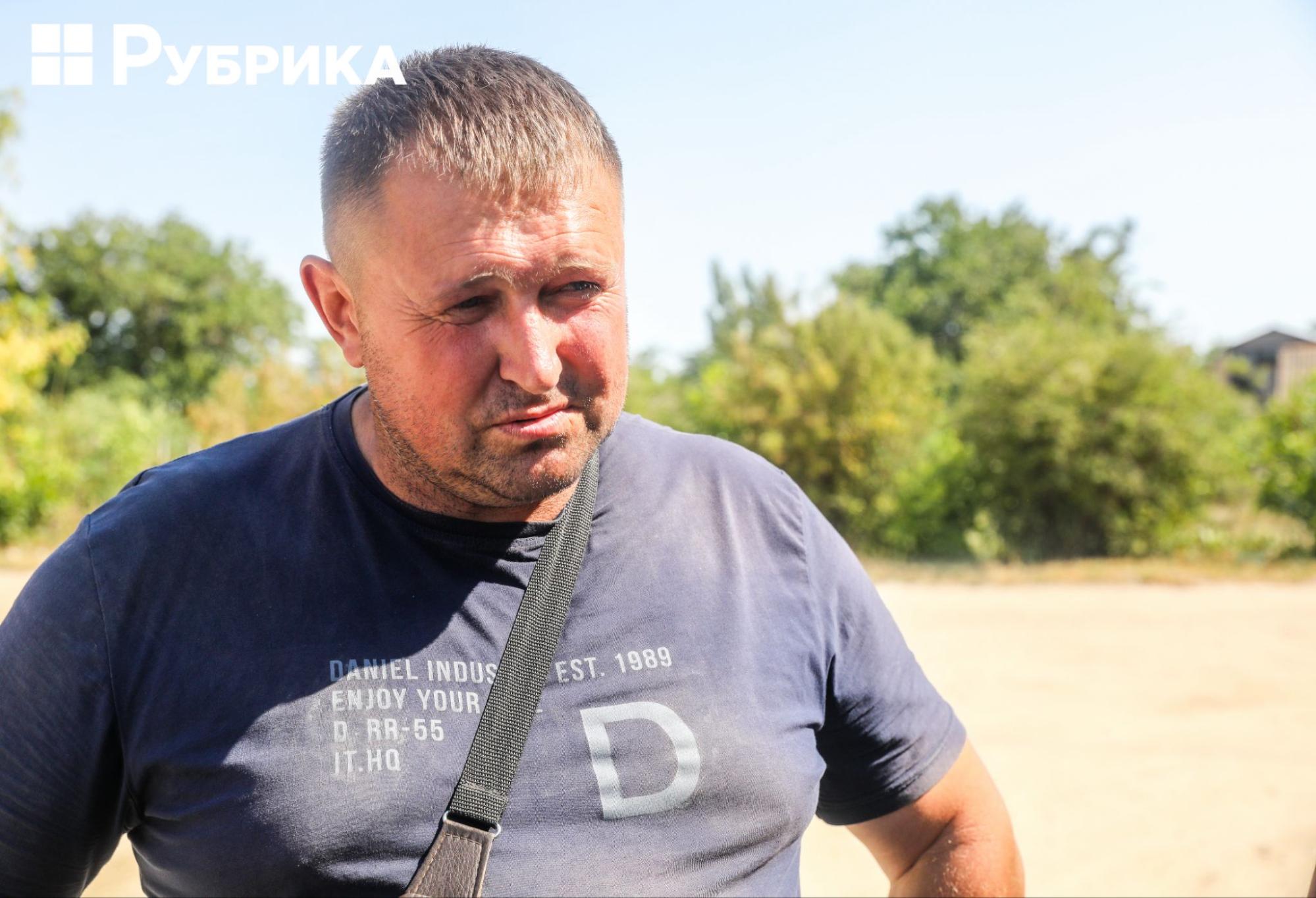
Serhii Dzuman
The farmer's equipment survived. He transported it from place to place several times. By his side, in Prybuzke, he left only one tractor. He calls it an "on-duty" tractor. On it, a farmer helps deliver water to civilians.
He says that there were many small farmers in his village, and people took loans and invested in their land. Now they have substantial losses. Out of 1,500 people, only 25 remained in Prybuzke. The rest left. Former farmers now work for other people's harvesters.
"I didn't leave at all. The family left, and everyone was sent away. My brother went to defend the country and died. And I'm here, and I'm not going to run away. I'm here till victory. I'm staying on this soil, alive or dead.
Now there is no profit at all. I sold the car and pay salaries to my boys and taxes to the state. I don't pay anything more. And I keep the funds to buy a fuel tanker and seed material at the first opportunity. And we'll see. I will not just leave it like that," says the farmer.
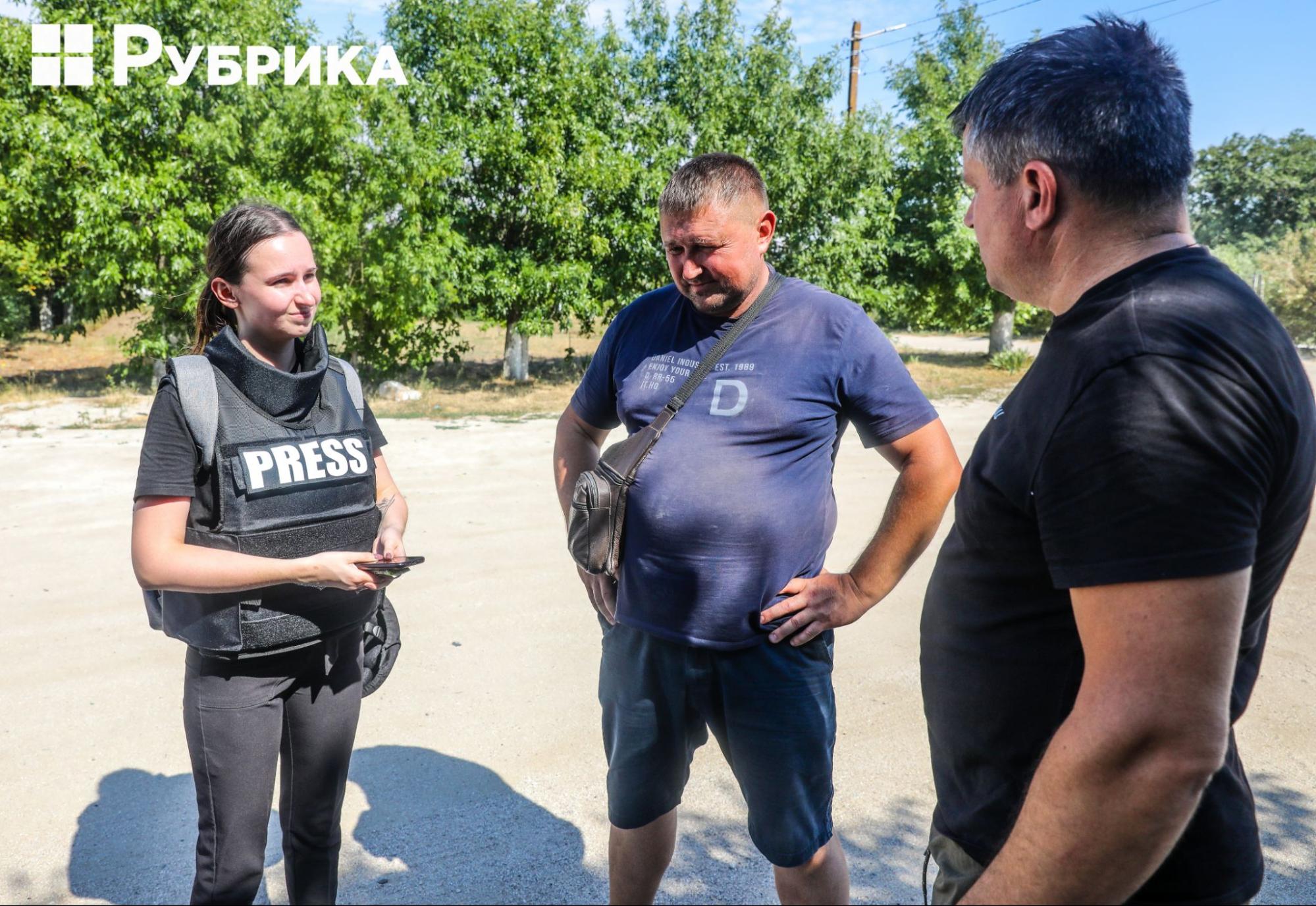
Serhii Dzeman's farm supplies products to companies including Sandora, Agrofusion, and Kherson Fruit Vegetable Plant. The loss of the harvest will lead to an increase in demand and a decrease in supply, and therefore to the rise in prices, which Ukrainians are already experiencing.
Mr. Serhii says he knows the land will have to be restored for a long time. First, we must wait for demining and invest resources in soil rehabilitation. Ecologist Yulia Katyba confirms the same.
"It will take about ten years, sometimes, even more, to completely restore and clean the soil. It is forbidden to grow agricultural products on such a territory due to the contamination of products with heavy metals, which are dangerous for the life and health of people and livestock. What to do with such fields? There are three options.
- Creating reserves territories, i.e., conservation. An example is self-seeded forests that formed after collective farms closed. When people did not cultivate some fields, forests appeared in their place.
- Studying fields and conducting several laboratory studies to detect contamination with heavy metals and other toxic substances. If there is destroyed military equipment in the area, acid from batteries, which are no less dangerous, could get into the soil.
- After obtaining laboratory conclusions, developing measures that improve the condition of the soil—application of fertilizers, reagents, planting fields with technical crops (if the area is previously demined and doesn't pose a threat to humans)"
The expert says it takes ten years to restore 1% of humus, which is responsible for fertility. It is also mandatory to check the soil for the content of heavy metals.
As for funds, according to the calculations of the Kyiv School of Economics, surveying the land and demining the territories will cost around 436 million dollars. And the further reclamation of the land is almost another 40 million dollars.
While we are driving along the broken roads of the Mykolaiv region, the military man who took it upon himself to show us the burning fields says:
"I also extinguished the field here once. Together with journalists from The Wall Street Journal, can you imagine? An American journalist was running here with a hose, and a Scottish security guard was running around with buckets, such a fearless man. The forest began to burn, and everything spilled over into the yards. Four fire trucks arrived, and we extinguished the plot with those journalists.
When we extinguished the fire, [village head] Natalia, with whom you spoke, found singers who sang to us, 'Halia carries water, the rocker arm bends'!"
The military man laughs heartily and reassuringly. And Vasyl waves us with one hand and tightly grips his pitchforks with the other. Then he turns his attention to his friend—he shows him where to drive the walk-behind tractor and continues his farming chores.
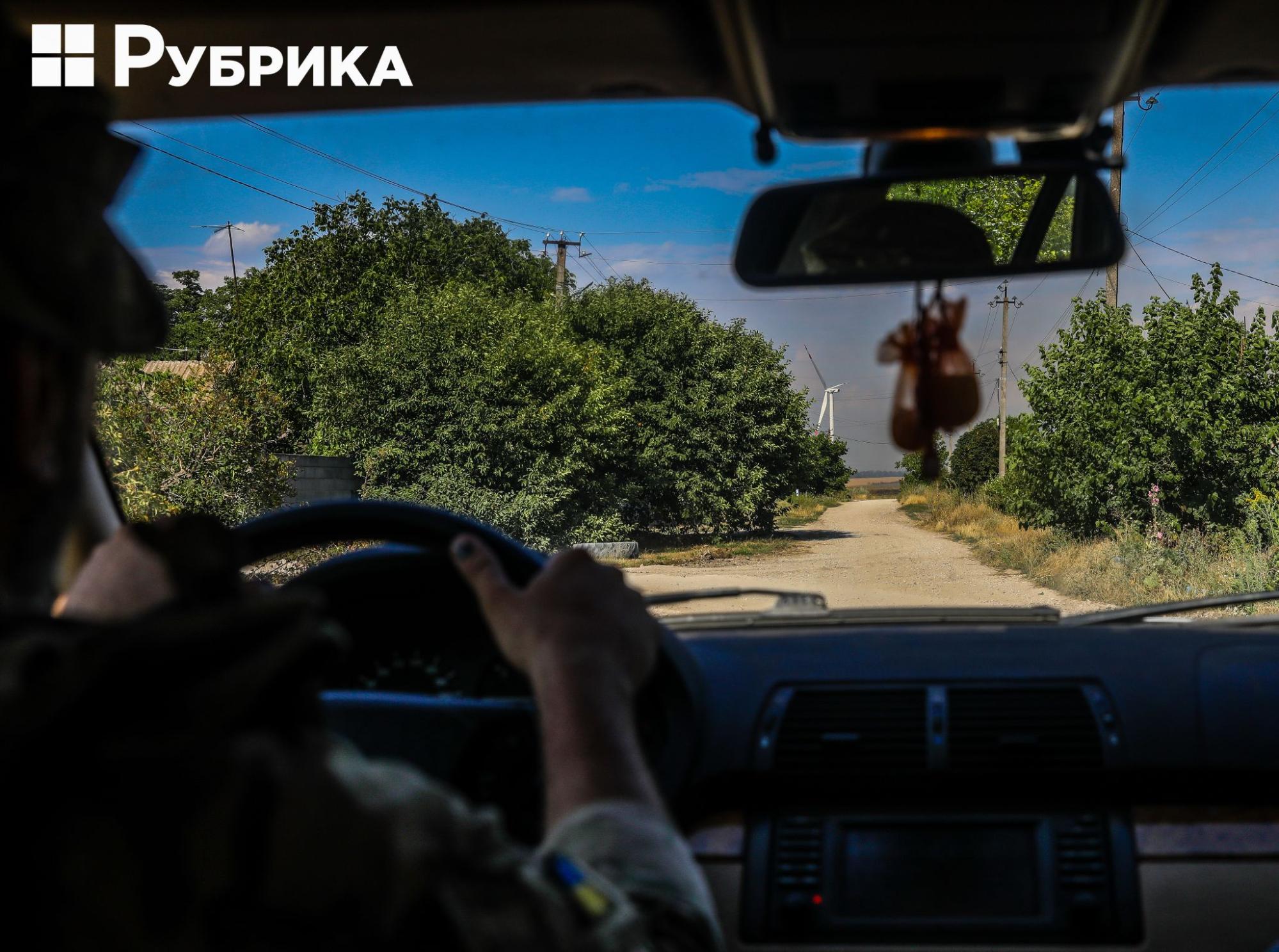
This article was created thanks to the NGO Internews-Ukraine within the Ukrainian Rapid Response Fund program, implemented by IREX with the support of the US State Department. The content is the sole responsibility of Rubryka and doesn't necessarily reflect the views of the US State Department and IREX.



